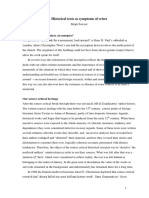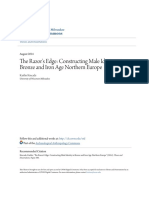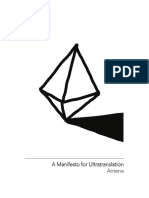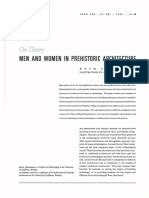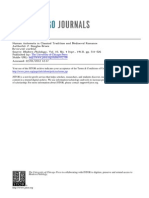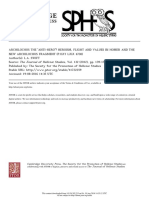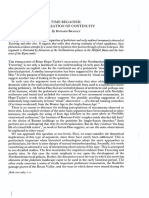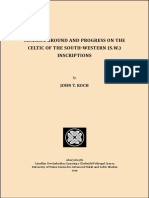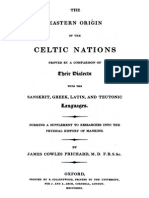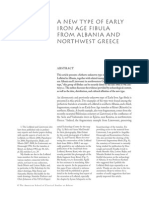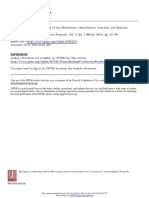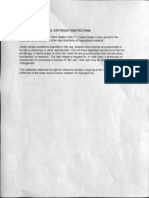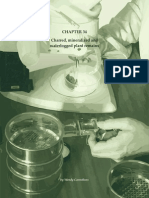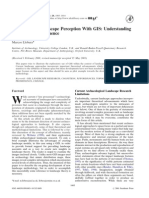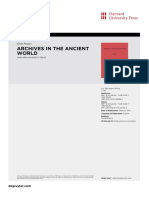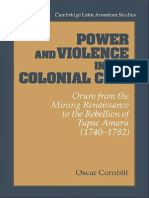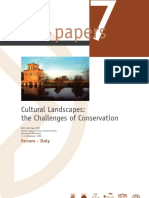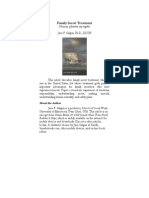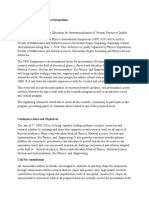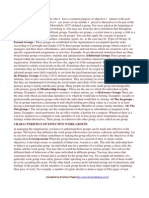Archives in Ancient World
Archives in Ancient World
Uploaded by
Carlos G. Hinestroza GonzálezCopyright:
Available Formats
Archives in Ancient World
Archives in Ancient World
Uploaded by
Carlos G. Hinestroza GonzálezCopyright
Available Formats
Share this document
Did you find this document useful?
Is this content inappropriate?
Copyright:
Available Formats
Archives in Ancient World
Archives in Ancient World
Uploaded by
Carlos G. Hinestroza GonzálezCopyright:
Available Formats
Back to the Future: Ernst Posner's Archives in the Ancient World Author(s): James M.
O'Toole Source: The American Archivist, Vol. 67, No. 2 (Fall - Winter, 2004), pp. 161-175 Published by: Society of American Archivists Stable URL: http://www.jstor.org/stable/40294274 . Accessed: 21/01/2014 11:21
Your use of the JSTOR archive indicates your acceptance of the Terms & Conditions of Use, available at . http://www.jstor.org/page/info/about/policies/terms.jsp
.
JSTOR is a not-for-profit service that helps scholars, researchers, and students discover, use, and build upon a wide range of content in a trusted digital archive. We use information technology and tools to increase productivity and facilitate new forms of scholarship. For more information about JSTOR, please contact support@jstor.org.
Society of American Archivists is collaborating with JSTOR to digitize, preserve and extend access to The American Archivist.
http://www.jstor.org
This content downloaded from 168.176.5.118 on Tue, 21 Jan 2014 11:21:23 AM All use subject to JSTOR Terms and Conditions
The
American
Archivist
Reconsidering
Archival
Classics
Back
to
the
in
Future:
Ernst
Posner's
Archives
JamesM. OToole
the
Ancient
World
in 1972, "W"A "Then Ernst Posner published Archivesin the Ancient World % l\ I most archivists in the United States and elsewhere knew astonishT T ingly little about the history of their own profession. There was not a little irony in this. They had received their own training primarilyin history, and that was how they thought it should be. Posner's book, one reviewer said, dispelled "any lingering doubts that the archivist must be trained basically A good many archivists still thought of themselves as historians in history."1 first and archivists second. Very few had ever set out deliberately to become archivists,though they found themselves, happily or otherwise, having fallen into that profession on the way to or from their own historical scholarship. While they appreciated the value of knowing the past, the history they had studied was more likely to be that of the institutions and people who had produced the kinds of records they now cared for. American archivistswere typicallyversed in the colonial and Revolutionary history of their own country, rather than that of other times and places. They had given little broad or systematic attention to the history of archives, of recordkeeping practices, of the changing nature of archivalmaterials, of the uses of records in society, and a host of other topics. Most archivists in this country had no ancient records in their collections and never would, and so knowing anything about those apparently abstruse subjects seemed inapplicable to the tasks more immediately at hand. A common joke among archivistsat the time asserted that they were practitioners of the world's oldest learned profession, but few had much understanding of the details of that hoary tradition.
1Lester Archiviste (January 1973):67-69. J. Cappon,reviewin American
The
American
Archivist,
Vol.
67
(Fall/Winter
2004)
161-175
161
This content downloaded from 168.176.5.118 on Tue, 21 Jan 2014 11:21:23 AM All use subject to JSTOR Terms and Conditions
The
American
Archivist
Even Posner himself admitted, with characteristic if not entirelyjustified modesty, that he had paid insufficient attention to the archivesof antiquity.By the time he began work on the book, he confessed in the opening lines of its preface, he had been teaching archives for more than two decades but had seldom given the history of archives and archivalpractice the consideration it deserved. As often happens, it took unusual circumstances (fellowships that removed him from his regular routine) for him to recognize what he called the "continuity of archival practices and problems" across the millennia (xxxi) ? Resolving to fill that wide gap in the knowledge and self-understandingof his profession, he spent more than ten years studying ancient archives and producing the volume that is now a classic of professional literature. If subsequent scholarship has both corroborated and challenged some of its conclusions, the original accomplishment is undiminished, and the book continues to reward study by later generations of professionals. To begin with, the scope of Archives in theAncientWorld is stunning, ranging from the clay tablets of Mesopotamia to the records of Imperial Rome, with intermediate stops in pharaonic, Ptolemaic, and Roman Egypt,classicalGreece, Persia, and Republican Rome, together with a "postlude"on the Parthian and neo-Persian empires of the Middle East in the early Common Era. In short, the volume considers severalthousand yearsof history,some verydifferent cultures, and a wide range of languages, most of them now hopelessly "dead."Mastery of any one of these would be a lifetime's work, as evidenced by the substantial historiographyin each field. The abilityto summarizeall of them for a nonspecialist audience was an even more difficult task,but Posner was able to pull that off, as the reviewsof his work happily noted. "Thegreat value of the book," said the classicist George Houston of the University of North Carolina in the American Historical Review,"isthat it gives us, in concise and accessible form, a of all ancient archives."3 Archivists,however, who might be considered survey the principal beneficiaries of reading the book, often treated it as a kind of curiosity. Even as they read it in the courses of the slowly emerging archival education programsof the 1970s, 1980s, and 1990s, they still had difficultyapplying it in any direct way to their own work. The information it offered about what were, to most of them, very unfamiliar cultures might be "interesting" or diverting, but it remained disconnected from their own practical concerns. What exactly did the problems of deciphering clay cuneiform tablets or papyri covered with exotic hieroglyphics have to do with managing collections of nineteenth-century letters, twentieth-centuryledger books, or the still photographs, moving pictures, and sound recordings on their shelves?At best, the archivesof the ancient world were deep- verydeep- background, unrelated to
2 Citations to Archivesin theAncient World will be 3 given in parentheses in the text.
George Houston, review in AmericanHistoricalReviewIS (April 1973): 408-9.
162
This content downloaded from 168.176.5.118 on Tue, 21 Jan 2014 11:21:23 AM All use subject to JSTOR Terms and Conditions
Back
to the Archives
Future: in the
Ernst Ancient
Posner's World
concern. An archivistmight take a kind of encouragement from any day-to-day the long history of the profession described in these pages, but the rewardsof reading were almost entirely personal, unconnected to one's "real" job. Today, the usefulness of Posner's work may be easier to appreciate, even for those archivistswho will never find themselves in the presence of an ancient - one thinks of Michael Clanchy'siwra record. Other works of archivalhistory - have Memoryto WrittenRecord,an unexpected "cult classic" for archivists become popular, suggesting the insights that can come from paying attention to the many meanings of records and recordkeeping, regardless of the content of any particularcollection of documents. Archivistsof the present are acutely awarethat they are living in the midst of an information revolution of enormous proportions. The waysin which information is captured and recorded, the ways information moves around in society, the uses (for good and ill) that we make of records and information, the constantlychanging formatsof records and the prospect that we will be unable to retrieve them from particularhardware-and - all these daily realities of archivists in the early software-dependent systems century are arguments for taking as broad an approach as possible twenty-first to understanding their work. A contemporary commonplace has it that the current information revolution is "unprecedented,"but a moment's reflection demonstrates that it has, in fact, many precedents. The introduction of writing systemsinto previouslyoral cultures was more of a revolution in human affairs than the spread of cheap and available computer technology, and it seems obvious that understanding such earlier revolutions might help us get through our own. With the right perspective or stance, present-dayarchivistscan learn something about their own work by studying the work at once very different and very similar of their remote predecessors. For that reason, Archivesin theAncientWorld reemerges not as a collection of oddities, but as a supremely relevantwork of history. More than once during his long and distinguished career, ErnstPosner was described with affectionate irony as Hitler's gift to the American archivalprofession. He had been born in Berlin on August 9, 1892, the youngest child in the family of a long line of medical doctors.4In 1910, he enrolled at the University of Berlin, where his father, a distinguished urologist, taught for manyyears,but the young man's studies were interrupted twice by militaryservice- first for a routine peacetime tour of duty and again for action on both the eastern and western fronts in the FirstWorld War. Wounded, decorated, and returned to civilianlife, he completed his studies in 1920, taking both a doctorate in history
4The briefbiography of The TwoCareers "Introduction: presentedhere is drawnfromPaulLewinson's
Ernst Posner," in Archives and the Public Interest:SelectedEssays by Ernst Posner, ed. Ken Munden
D.C.:PublicAffairsPress, 1967), 7-19. See also MeyerFishbein'stributein American (Washington, is in the Washington Post,24 April1980,p. C4; 43 (Summer1980):426-28. Posner'sobituary Archivist an affectionateletter to the editor from a formerAmericanUniversity colleagueappears4 May1980, p. C6.
163
This content downloaded from 168.176.5.118 on Tue, 21 Jan 2014 11:21:23 AM All use subject to JSTOR Terms and Conditions
The
American
Archivist
and his teaching license. Rather than pursue an academic career, however, he went to work in the PrussianState Archives, quicklyassuming a range of duties and rising to the number two position in the administration of the agency. In addition to his regular responsibilities, he began to publish on archival and historical topics and to teach in the in-house Institute of Archival Science. He also oversawa multivolume documentary edition pertaining to eighteenthcentury German history. By the time he married in 1929, a distinguished archivalcareer was alreadywell underway. Life changed dramaticallyfor Posner, as it did for all GermanJews, with the accession of Hitler to power at the beginning of 1933. The young archivist was dismissed from his administrative posts immediately; only his service in the Great War saved him, for the time being, from getting fired outright. Still, it was clear that he could continue his career only outside Germany, and a visiting historian from the United States suggested the possibilityof his coming to America. He visited this country in 1938, making the acquaintance of such leaders of the emerging archival profession as Waldo Gifford Leland, Solon Justus Buck, and R. D. W. Connor. Unhappily, Posner had to return home at the conclusion of this lecture tour, and he arrivedjust in time to be rounded up in the wave of arrestsand violence that followed Krystallnacht. He was sent for six weeks to the Sachsenhausen concentration camp and might have perished there, but for his wife Katherina's dogged pleas for his release, based on his status as a veteran. He fled first to Stockholm and then to London, where she joined him, and the two landed in New Yorkin July 1939. Buck, who was then the director of research and publications at the National Archives,was scheduled to offer a course in archivesadministrationat the American Universityin Washington, D.C., that fall, and he asked Posner to teach it with him. Within a few short years, Posner was teaching it on his own, cementing a relationship with the universitythat would last for the remainder of his active career:he would eventuallyserve as chair of the historydepartment and dean of the graduate school. At a time when formal archivaleducation was virtuallynonexistent, Posner made the American Universityprogram the only place in North America where students could study the history and practice of archives as a scholarly discipline, both during the academic year and in the summer institute he quickly established in cooperation with the National Archives.His interests extended to other emerging disciplines as well, including an institute on the management of historical sites, which he conducted under the auspices of Colonial Williamsburg. He became active in the still-young Society of American Archivists,serving as a member of its council and editorial board and as president in 1955-1956. His standing in the profession made him the inevitable choice to conduct the landmark surveyof the archivalprograms of the states, funded by the Council on Library Resources and resulting in AmericanStateArchives in 1964. His health failing in the next decade, he
164
This content downloaded from 168.176.5.118 on Tue, 21 Jan 2014 11:21:23 AM All use subject to JSTOR Terms and Conditions
Back
to Archives
the
Future: in the
Ernst Ancient
Posner's World
retired and moved to Switzerlandand then returned to his native land, where he died at Wiesbaden on April 18, 1980. Before that, however, he had devoted many years to his study of ancient archives.A Guggenheim Fellowship in 1957 and a Fulbrightin 1958 permitted him to spend time in Rome, conducting the in theAncient research that would result a decade and a half later in Archives He was also working on a companion volume on archivesin the medieval World. period, which he did not live to complete.5 Posner found a number of consistent themes in ancient archivesthat served as the connecting tissue through the widely differing civilizations he studied, and it was the long-term continuity of records and recordkeeping practices that impressed him most. The essential characteristicsof records that were familiar in the present had been there, in one way or another, since antiquity. Lester Cappon underlined this point in his review of the book for the American of today, Cappon wrote, "shouldseize the opportunity, "Thearchivist" Archivist. availablenow for the firsttime, to learn about his predecessors,nameless though Posner's starting point was Their problems are still his problems."6 they be "muchin common with had ancient world of the archives that the belief firm a those of our own times" (2) . It was possible, for example, to identify "thosebasic types of records that may be called constants in record creation" (3) , regardless of the particularculture or institution that produced them. He specified six of these: laws;records of administrativeactivity;financial and accounting records; land ownership and tax records; records that facilitated "controlover persons" in such areas as military service and forced labor; and "notarial"records, by which the state sanctioned and preservedthe privatetransactionsof individuals. Financialrecords of all sortswere perhaps the most numerous, and their impact was long-lasting,helping to fix "the character of financial administration"right down to the modern period (11). It was true that the distinction between was not as sharp current records ("files")and noncurrent records ("archives") in the ancient world as it would become in the modern one, and therefore the historyof what moderns would consider the specificallyarchivalcomponent of ancient recordkeeping "mustremain uneven and even partlycontestable" (8). could be usefully applied to the host of records that Even so, the word "archives" been digging up and cataloging for nearly two centuries by archaeologists had the time Posner wrote. In the same way, most aspects of the administration of records in the ancient world were fundamentallythe same as those of the present. "Alltypes of archivalorganization[s] known to us were already in operation in the ancient Near East,"he insisted, "fromsimple storage facilities to archivalestablishments
Archivistreview. Cappon mentions the intended volume on medieval archival practice in his American 6 Archivist36 (January 1973): 69. Cappon review, American
165
This content downloaded from 168.176.5.118 on Tue, 21 Jan 2014 11:21:23 AM All use subject to JSTOR Terms and Conditions
The
American
Archivist
of considerable size" (28) . Records-consciousbureaucracieshad emerged early, never more fully than in the Egypt of the pharaohs (71), and most of the recognizable archivalfunctions were also apparent.Accessioning, though sometimes helter-skelter,required that recordkeepers work closely with administrators to ensure an orderly flow of materialsinto archivalcustody (151-52). Like modern records, ancient recordswere periodicallyappraisedand some of them subsequently destroyed. This might be done by selling them to the ancient equivalent of the recycler- in Egypt, this meant giving used papyri to the embalmers (138) - or, as with some tax records on wooden tablets in Republican Rome, by burning them in the aftermathof a tax amnesty (162-63) . Arrangement and description occupied ancient archivists no less than their successors,with persistentconcern for the "administrative latter-day provenance and . . . original arrangement" of records (5). Some Sumerian tablets were for instance, and there were also many examples clearlyidentifiable as "series," of "lists and other finding aids" (61). In Rome, even though the evidence was fragmentary,what would later be recognizable as the principle of provenance seemed to have been in effect. Records of magistrates and legislative assemblies under the Republic were kept in at least eighteen distinct "record groups" (183), while under the Empire, "organicseries"were clearly evident, "notintermingled"with other series, and arranged in such a waythat particular rolls could be identified as partsof distinct "recordunit[s] ,"flagged by a clearly deliberate system of labeling (196-97). The notion of research was of course unknown in the ancient world, but archiveswere still used regularly,and many repositories were located in prominent places in ancient cities precisely so they would be easy to access (53). The Greeks were particularlyefficient at providing "reference service" (113), permitting both the production in court of precedent-setting documents and the compilation of historicalcollections of decrees and other official actions. As modern archivistsknow, the connection between arrangement and reference was a critical one and, however well done, not alwaysfoolproof. Posner took a certain delight in reproducing the note that a recordkeeper in Roman Egypt had written to himself on a surviving papyrus: "See where the contract of Alexander with the son of has gone" (146) . Finally,physicalpreservationwas a necessityin the past as in the present, and a good deal of the ancient archivist's energy had to go into preventing the destruction of fragile records. Some Mesopotamian tablets were enclosed in a second layer of "clayenvelopes," for example, and they were stored in irrigated rooms that provided the "desirable atmosphericconditions"by allowingtrenches of evaporatingwaterto keep them moist and thus less likely to crumble or shatter (51-56). Excavationsacross the ancient world permitted some other generalizations about archival buildings. The Greeks offered the most famous examples, and Posner devoted considerable attention to the archeions of the Greek city-states
166
This content downloaded from 168.176.5.118 on Tue, 21 Jan 2014 11:21:23 AM All use subject to JSTOR Terms and Conditions
Back
to the Archives
Future: in the
Ernst Ancient
Posner's World
which, in addition to caring for documentation in their own time, subsequently to western languages. There were at least twenty gave the very word "archives" cities that had such buildings in the classical period, and their function and importance was sufficient to call forth a detailed description in the Politicsof Aristotle (91-92). Most elaborate of all was the Metroon (pronounced in three syllables) on the Agora at Athens, rebuilt as a records facility toward the end of the fifth century BCE and survivinguntil the third century CE (102-114). The archaeological record, together with survivingwritten sources, also provided evidence about the personnel who managed ancient collections of - again, records. The elaborate "clerical apparatus"of Graeco-Roman Egypt without the strictdistinction between current and older records seemed most developed. At the highest level of Roman administration in the Nile Valley, there might be one clerk to keep the daybooks,another for the correspondence, at least seven accountants (some with as many as ten assistants), and a "counterscribe"whose dutywas to keep all the others honest (138-39). To be sure, these were the equivalent of modern-day file clerks and bureaucrats as much as but the maintenance of systematiccollections of recordswasdefinitely archivists, a part of their function (143-44) . Archivistsof the modern period who studied would find much that was recognizable from their in theAncientWorld Archives own experience. Perhaps even more important, they could find in its richlydocillustratedpages a certain reaffirmationthat they were umented and attractively indeed carryingon a nearly timeless tradition. Almost as far back as it was possible to see in human affairs, the care of records had been essential to social organization. For that reason alone, Posner's book merited the place it quickly won in archivalscholarship, a place it rightly retains today. It is no disparagementof Posner's work to observe that the studyof ancient record making and recordkeeping has continued in the decades since and that others have now challenged, refined, and revised some of his conclusions, even as they have confirmed others. A scholar of the highest standards,Posner himin theAncientWorld self would have expected no less. Readers of Archives today have an advantage he did not: another generation and more of scholarship, work that continues into the present. Since he wrote, classicists and ancient historians have been going over some of the same ground he covered, but they were driven by new questions and different perspectives. A review of some of that scholarship shows how lively and, to archivists, important a field this remains. Centralto this recent work has been a new interest in the historyof literacy. Of all the inventions of the ancient world, one was so obvious that it had been easy to overlook: writing itself. The societies Posner examined were ones in which writing systems had been created, making it possible to store information reliably outside the individual human brain while still keeping it usable. Despite the widespread use of pictographic and other earlier systems,it was the
167
This content downloaded from 168.176.5.118 on Tue, 21 Jan 2014 11:21:23 AM All use subject to JSTOR Terms and Conditions
The
American
Archivist
emergence of the Greek alphabet by the middle of the eighth century BCE that proved the decisive turning point, transforming Greece from a predominantly oral culture to one that depended in essential ways on writing. Eric Havelock, a classicist,and Jack Goody, an anthropologist, led the way in these studies, arguing that the introduction of writing precipitated nothing less than a fundamental restructuringof the human mind. So long as the brain had to be occupied, as it necessarilywasin oral cultures,with storing information unaided by external assistance, humans had to remember things in precise ways:the epithets and other mnemonic prompts of Homer, for example, had to be recalled the same way every time or crucial parts of the narrativewould be lost. and dawn had Indeed, that was their purpose. Achilles alwayshad to be "brave" to be "rosy-fingered" to "huff and puff much the bad wolf had later, just as, big and blow your house down" if their respective stories were going to come out right. Once the mind was freed from that necessity, because information could be written down externally and yet called back into service whenever desired, new ways of thinking were possible. One could be more analytical, taking a ' received idea and rearrangingit, asking "what-if questions, exploring a greater range of counter-factual possibilities, trying to say the same thing differently, and so on. It was no accident, Havelock asserted, that philosophy emerged from a literate world rather than an oral one.7 Insights about the functions and meaning of literacy set historians to the taskof exploring the variousroles that writinghad played in earlier civilizations. It was curious that this task had not been undertaken previously. After all, learned men and women had been poring over classical texts for centuries. Approaching them less for what those texts actually said, however, and more from the perspective of what their very existence might mean opened new ways of looking at the specifically archival component of ancient writing. WilliamV. Harris,then chair of the historydepartment at Columbia University, provided a comprehensive surveyof these issues in the Graeco-Romanworld. Like Posner, he began by wondering whether it was possible to generalize about the uses of writing,but where Posner had found only six "basictypesof records," Harris readily identified forty-one possible uses of writing and recording in a list that was not, he said, "exhaustive." The records of financial accounts and
7The most important texts in this emerging approach include Havelock's principal works: Prefaceto Plato (Cambridge, Mass.: Harvard University Press, 1963) and The LiterateRevolutionin Greece and Its Cultural (Princeton: Princeton UniversityPress, 1982) . See also severalvolumes from Goody's Consequences prodigious output: TheDomestication of theSavageMind (Cambridge: Cambridge University Press, 1977), The Logicof Writingand the Organization of Society(Cambridge: Cambridge University Press, 1986), and The InterfaceBetweenthe Writtenand the Oral (Cambridge: Cambridge University Press, 1987). Also useful are BarryB. Powell, Homerand the Originof the Greek Alphabet(Cambridge: Cambridge University and Paideia in AncientGreece Press, 1991); and Kevin Robb, Literacy (New York:Oxford University Press, 1994). Philosophical perspective is also provided by Walter Ong's readable Oralityand Literacy:The (London: Methuen, 1982). Technologizing of theWord
168
This content downloaded from 168.176.5.118 on Tue, 21 Jan 2014 11:21:23 AM All use subject to JSTOR Terms and Conditions
Back
to Archives
the
Future: in the
Ernst Ancient
Posner's World
various legal documents that Posner had specified were all there, but so were some that seemed to have entirely different purposes. Writingwas used to label things, to make simple reminder-notes to oneself, to displaypolitical slogans, to petition authority, to commemorate the dead, to dedicate objects or people to the gods, to curse someone, to assist in performing magical spells, and even to compile collections of information, such as textbooks.8The level of literacy in the ancient world was much lower than scholars had previously believed, Harrisinsisted- never more than 10 percent of the population in either Greece or Rome, and probably well below that figure- but the uses of literacy were much wider than we had formerly appreciated. Harris'sattention to archivesas such wasnot as systematicas Posner's- that was not his intention- but what he sawboth supported and expanded some of his predecessor's conclusions. He concurred that the creation of the Athenian state archives was a crucial development and that the spread of what Posner had called notarial archives, safeguarding private records in public facilities, was likewise significant. In the Roman provinces by the second century CE, this There might be variationsfrom place even represented a kind of "archivization." but there was evidence to place as to what kinds of records were "archivized," that the process, once underwayin one part of the Empire, was likely to spread to others as well. Harrisdid note that the systematickeeping of statuteswas slow to develop and, just as significant, that laws were sometimes "preserved"by inscribing them on stone and displaying them publicly, rather than by copying them onto fragile scrolls and storing them in an archives. Still, a number of developments in Rome indicated a kind of inexorability to the "archivization" process. Since formation of the Empire under Augustus,the births of all citizens were recorded and kept, for instance, along with the records of taxation and the census, including (presumably) those mentioned in the Christiangospels.9 HoweverclumsyHarris's"archivization" neologism, he wasright to raise the criticalquestion of the extent to which a recognizable archivalor documentary mentalityhad developed in the ancient world. Even if one could identify collections of records that looked, to later observers,like archives,was it correct to say that these were sufficientlylike modern archivesto justify use of the term in the same sense? Were there in antiquitydeliberate collections of records, kept for with their enduring value and future use? Those issues werejoined particularly most scholars later that here was it and to sharply challenged respect Greece, and most vigorouslydefended Posner's earlier conclusions. The clearest call for
8 William V. Harris, AncientLiteracy (Cambridge, Mass.: Harvard University Press, 1989) , 26-27.
9For the notion of "archivization," see Harris,Ancient 204, note 149. His remarkson Greek Literacy, at pages207 and areat page 77;his commentson Romanpractice andrecordkeeping archives practices andJoseph's wasadducedas the reasonfor Mary 209. In the Gospelof St. Luke,the censusof Augustus journeyto Bethlehemfor the birthofJesus.
169
This content downloaded from 168.176.5.118 on Tue, 21 Jan 2014 11:21:23 AM All use subject to JSTOR Terms and Conditions
The
American
Archivist
rethinking came in the early 1990s from Rosalind Thomas of the Universityof London, who deliberatelyset out to move beyond what she called "therationalist view of writing."It was a bias of literate people such as ourselvesto suppose that written documents meant only (or primarily)what the words in them said, and like all biasesthis one obscured our vision, especiallywhen looking at the verydifferent cultures of antiquity.There were a host of " 'non-literate'uses of writing," and this led her she maintained, uses that were "symbolic or non-documentary," to conclude that "Greek(and indeed Roman) writinghas manyforms and functions- symbolic and magical, for example- which take us beyond the message contained merely in the written content of the document."Just as important, as Havelock and others had argued. That writingwas not always"pre-emptive," notion held that literacy,once introduced into a given time and place, essentially drove out orality, that oral forms of transacting human affairs were simply replaced by written forms, which seemed more efficient and simply "better." Rather, Thomas insisted, literacyand oralitycontinued to coexist in constantly shifting relationship to one another.10 The effect of this broader view of the uses of records- written documents were not intended only for such purposes as keeping trackof financial accounts; sometimes, they might be made because they were thought to increase the potency of curses, not what we would consider a practical reason for record making- was to draw attention to "awhole range of texts . . . whose primary functions might not have been 'documentary'and administrative." That insight in turn led Thomas to conclude that it was anachronistic to look for too many parallelsbetween ancient and contemporarydocumentarypractice,particularly as they related to archives.For Posner to have claimed (156), for example, that one ancient businessman "musthave realized the wisdom of clearlyidentifying each letter before filing it"wasan attempt at drawingtoo straighta line from the present to the past, resulting in "apicture of reasonably effective and blandly modern archive-keepingin the ancient world,"a picture that was as misleading as it was bland. Moreover,significantvariationsin the uses of writingfrom place to place might be elided into a common experience that never actuallyexisted. The Metroon of Athens seemed a direct ancestor of modern-daynational and state archives, but how did that compare with the recordkeeping practices of other cities? How, for example, to explain the almost complete absence of records at the same time in Sparta,"astate,"Thomas said, "whichseems to have run in all essentials without the help of writing, let alone archives"?Even in Athens itself, it was difficult to find a persistent reliance on documents that
10Rosalind Thomas, Literacyand Orality in Ancient Greece(Cambridge: Cambridge University Press, Recordin ClassicalAthens (Cambridge: Cambridge 1992), 74. See also her Oral Traditionand Written
influencedmy own thinking, Press,1989). Thomas'swork,and thatof others,significantly University at about this same time, in 'The SymbolicSignificanceof Archives," 56 (Spring American Archivist 1993):234-55.
170
This content downloaded from 168.176.5.118 on Tue, 21 Jan 2014 11:21:23 AM All use subject to JSTOR Terms and Conditions
Back
to Archives
the
Future: in the
Ernst Ancient
Posner's World
indicated an "archival mentality":there were no land registries, no citizenship no lists, general accounting of public funds, no records of crime and punishment, and on and on. Writtendocuments did indeed exist and circulate,but the vast majorityof citizens remained blissfullyunaware of the written word, were rarelytouched by it, and seldom had any reason to pay attention to it. Ancient Greece might look like a place that "relied extensively"on records and documents, but that was a false impression: instead, it remained "an oral society in which the written word took second place to the spoken."11 If Thomaswasdirect in her challenge to Posner, he soon found his defender in a young American scholar, James Sickinger of Florida State University. Sickingerhad writtena doctoral dissertationon the Athenian Metroon, and that had led him to addressquestions of the nature and role of public records in the ancient city. He conceded that oral forms had retained their significance long after the introduction of writing, but he insisted that citizens there also "made, used, and kept written records related to their public business from a very early time."The central documentarycollections of that repository (originallya temple to the mother of the gods, thereby suggesting the importance that was attached to recordkeeping by associatingdocuments with a potent divine force) did not just appear out of nowhere in the late fifth century BCE;instead, the of very use of records had grown steadilyfor some time beforehand. The survival early law codes, such as that of the sixth-centurylawgiverSolon, suggested that the importance of preserving public records had been recognized from a very earlydate, perhapseven within a centuryof the appearanceof the alphabetitself. It was true, as Thomas had asserted, that the public displayof laws by means of monumental inscription was as likely as storing them in repositories in other media, but that did not prove the absence of an intention to preserve them as archives.To begin with, inscriptions represented only a small percentage of all the records created and preserved,and other evidence demonstrated that "writ" ten documents were verymuch a part of the civic life of fifth-centuryAthens. It was fine, Sickingerconceded, to warn against the dangers of anachronismwhen studying ancient archives, but he thought that Thomas had done so "perhaps in her critique of Posner.12 excessively" The evidence Sickinger found suggested a more nuanced view, tending to reinforce Posner's conclusions about the overallcontinuitybetween ancient and
11 3. See her explicitchallengeto Posnerat pages 93-95; her comparison andLiteracy, Thomas,Orality ancientliteracy, in studying at pages 136-39. Fora cautionagainstanachronism of Athensand Sparta de l'Ecriture: en et archivesdes cits,"in LesSavoirs see also StellaGeorgoudi,"Manires d'archivage de Lille, d. MarcelDtienne and Giorgio Camassa(Lille: Presses Universitaires Grce Ancienne, 1988), 221-47. 12 of North Athens(Chapel Hill: University in Classical and Archives James P. Sickinger,PublicRecords also presentedhis case for a specifiCarolina Press,1999), 3, 24-33, 72, 91, and 198 note 3. Sickinger in the AncientAthenianDemocracy," audiencein "Literacy, Documents,and Archives callyarchival Archivists (Fall1999):229-46. American
171
This content downloaded from 168.176.5.118 on Tue, 21 Jan 2014 11:21:23 AM All use subject to JSTOR Terms and Conditions
The
American
Archivist
modern archival practice. Not only did the Metroon and other repositories point to this conclusion, but the emergence of particularpersonnel, facilities, and procedures apparentlydesigned to provide systematiccare for archivesfurther demonstrated the development of those tasks.This evidence was sufficient to conclude that Posner's reviewof ancient archivesin the light of modern practice was not entirely out of place. The ever-expanding number of secretaries, for example, mentioned in various texts (including Aristotle's Politicsagain), indicated an increasinglycomplex differentiation of roles in record making and recordkeeping functions. Some of these had general clerical responsibilities, but some seemed to specialize in copying, others in filing and retrieving, and still others in the care of only certain kinds of documents and not others. With these specialistscame more attention to the management of documentary collections. Systemsfor the dating of records, a reliable key to their organization, were standardizedsurprisinglyquickly,and this gave documentary collections greater precision than the more selective monumental inscriptions. Moreover, the uses that citizens made of records were varied, and these had a self-reinforcing effect: increased calls for the use of records promoted greater care in managing them. "Athenians of the classical period were notoriously litigious,"Sickingerpointed out, and the use of records in legal proceedings and arbitration spread rapidly. Legislators apparently consulted older laws when drafting new ones, and texts served as important sources for political argument and other forms of oratory. Finally, documents began to assume their critical function in the study and writing of history,a genre created by Herodotus, who clearly used but did not reproduce documents in his history of the conflict between the Greeks and the Persians, and Thucydides, who did reproduce a number of texts word for word in his account of the warsbetween Athens and All this wasstill a long wayfrom modern notions of researchin archives, Sparta.13 of course, but it nonetheless lent support to Posner's claim that practices familiar in the present were also recognizable in antiquity. Further refinements in our knowledge of the role of records in Greece will no doubt be forthcoming, but in the meanwhile scholars have returned to some of the other civilizations considered in Archives in theAncientWorld, civilizations that are perhaps less well known to westerners than Greece and Rome. The general result is more support than revision for Posner's conclusions. Particularlyuseful in filling those gaps is a collection of essaysassembled by MariaBrosiusas an outgrowth of a conference at Oxford University'sCentre for the Studies of Ancient Documents in October 1998.14 For those participants,
13 On the specialization of recordspersonnel,see Sickinger,Public Records andArchives, 141-45;on the datingof records,see pages 150-57;on the use of records,see chapter7 (Consultation).
14Maria Brosius, d., AncientArchives and ArchivalTraditions:Concepts in theAncientWorld of Record-Keeping
Press,2003). (Oxford:OxfordUniversity
172
This content downloaded from 168.176.5.118 on Tue, 21 Jan 2014 11:21:23 AM All use subject to JSTOR Terms and Conditions
Back
to Archives
the
Future: in the
Ernst Ancient
Posner's World
the recordkeeping practicesof Greece represented the end of the story,not the beginning, so they went back further in time. Drawing on what can appear to nonspecialists as excruciatingly careful but stunningly learned archaeological, textual, and other forms of reconstruction, the authors considered case studies of record creation, management, and use in such places as ancient Ebla,Assyria, Minoan Crete, and elsewhere. The surviving records from these places were almost exclusively financial accounts and legal proceedings. None of the symbolic or metaphoric uses of writing (if any) had survivedin these cultures,as they had in Greece and Rome, but the approaches to managing even that limited range of documentation were still impressive. The languages of these records included those that have been deciphered only recently and, in some cases, incompletely: Linear A and B, noncuneiform Mesopotamian, and various multilingual forms in Aramaicand Assyrian.Brosius and her colleagues started from the premise that Posner's book is "still unsurpassed in its attempt to discuss archival traditions of different civilizations."Even if later work such as their own added detail and offered changed interpretations, their debt to him wasundiminished. They cast their net more widely acrossdiffering civilizations, but these comparisons with the more limited range he had studied had an important cumulative effect. Brosiusherself rightlyframed the severalcases of her contributorsin terms The identification of particularcollections of records and of archivaltraditions. archives was less important than the question of whether or not there were enduring, identifiable traditions and practices for the care and use of records. The presence of such systematicreliance on documentation would constitute evidence for the existence of the kind of "archival mentality"of which Thomas had spoken. For most of the civilizations under consideration, that mentality did indeed seem to be present. Rudimentary forms of records management were evident: at Ebla, for instance, individual bits of information in certain documents were regularlycompiled into other, more complete forms, and the originals destroyed. There were many procedures and criteria for selecting certain documents and not others for long-term retention, and these expressed deliberate judgments about the values of records. In Assyria in the ninth century, private business records and deeds might be maintained over several generations, while the public records of one king were often destroyed immediately by his successor, eager to wipe out his memory and, in effect, start the world over again with the new regime. Procedures for organizing archives so that information could be retrieved when needed also emerged across the ancient Near East. In Persepolis, the very shape of the tablets on which information was recorded might indicate what kind of record it was, probably so that like items could be stored together. Most texts were inscribed on ovals, but financial accounts were recorded on rectangles, and there was even some differentiation of size and shape among the rectangles. Much earlier, at Ur,
173
This content downloaded from 168.176.5.118 on Tue, 21 Jan 2014 11:21:23 AM All use subject to JSTOR Terms and Conditions
The
American
Archivist
there had been similar efforts to organize growing collections of documents, storing letters that pertained to particular legal actions together with their formaljudicial outcomes, much like the modern case file. Thus, ancient archives shared many characteristics with their modern counterparts,providingaccountabilitythrough the preservationand organizationof records. It would be wrong, of course, to think that any archives in antiquitywere "public"in the same way that modern repositories are, but for those who created and maintained them, archiveshad some obvious advantages.15 Another contribution to understanding archival practice in the ancient world came from an examination of the related world of libraries in Lionel Casson's popular Libraries in theAncientWorld, which appeared in 2001 and got wide distribution after it was picked up by several book clubs. In a time long before the easy reproduction of mass copies of texts, the modern distinction between librariesand archiveswas hardly a sharp one, and Casson, an eminent classicist, acknowledged as much even as he charted emerging distinctions. At Nineveh, for example, administrativerecords were distinct from scholarly texts, recorded omens, and literaryworkssuch as the Gilgamesh epic; the latter three categories are more properly understood as protolibraries than as early archives. The very possibility of libraries was first realized by the Greeks, who along with perfection of the alphabet also devoted the necessaryattention and resources to teaching people how to use it by setting up and maintaining schools. Growing, if alwayssmall, numbers of people who were able to read called forth increasing numbers of texts to be read: demand really did have an effect on supply. There, and later in Rome and elsewhere, systemsfor the faithful production of multiple copies of plays, philosophical works, and other writings combined with a wider availabilityof writing materials (papyrus, ink, pens) to promote the growth of libraries that looked much like their modern counterparts.16 The storied libraryat Alexandria, established about 300 BCE, serves as an appropriate exemplar of ancient librarypractice, and it helped set later standards as well. The great collection was, Casson tellingly points out, both "comprehensive, embracing books of all sorts from everywhere, and it was public, open to anyone with fitting scholarlyor literaryqualifications."Great attention was paid to the acquisition of texts: since Alexandriawas a new city with little to recommend it on its own, scholars had to be attracted there by the promise of
15 An See, in particular, Maria Brosius, "Ancient Archives and Concepts of Record-Keeping: in Ancient Archives and Archival RecordIntroduction," Traditions, 1-16; Alfonso Archi, "Archival MarioFales,"Reflections on Neo-Assyrian ibid., 17-36; Frederick Keepingat Ebla,2400-2350 B.C.," an Archive:Account and Journal Texts Archives," ibid., 195-229; MariaBrosius,"Reconstructing from Persepolis," van Lerberghe,"Private and Public:The Ur-UtuArchiveat ibid., 264-83; and Karel ibid., 59-77. (Tell ed-Der)," Sippar-Amnanum 16 LionelCasson,Libraries in theAncient World YaleUniversity Press,2001), 11, 18, 21-26. (NewHaven:
174
This content downloaded from 168.176.5.118 on Tue, 21 Jan 2014 11:21:23 AM All use subject to JSTOR Terms and Conditions
Back
to Archives
the
Future: in the
Ernst Ancient
Posner's World
being able to find items they might not be able to get their hands on elsewhere and texts that were more reliablycopied than in other places. The collection has been estimated to consist of just under half a million rolls, with another forty thousand in a branch "daughter library."Separate storage rooms filled with shelving were adjacent to the main hall, insofar as we can tell, and a detailed system for classifying and arranging the books on shelves was perfected by successive directors of the library.Borrowingwas not permitted- readers used the collection on-site- but that became part of regular library practice by Roman times. The Alexandrian librarycame to a sad end, of course, though the precise date and reasons for its destruction remain controversial among scholars. Still, many features of its organization and administrationwere replicated in less legendary collections until the end of the classicalperiod and well beyond. The crucial change in the format of library materials from scroll to codex was a later development, also discussed by Casson, one that enhanced the efficiencywith which readerscould use those texts, and that shift pointed clearly toward the characteristics of libraries in the present.17Like Posner, Casson emphasized the continuity between ancient and modern practice. The continuing study of ancient librariesand archivesis a testament to the in theAncient work that Posner so ablybegan nearlyhalf a century ago in Archives with have scholars Even where subsequent World. him, they still have disagreed had to make their intellectual case on terms he largely defined. Most scholars, regardless of their discipline, can only dream that their work will have such a lasting impact. But this is not a battle to be waged or observed only by specialists; nor is it one that pertains only to arcane disagreements about a remote, irrelevantpast. All archivistscan learn something from these discussionsand should familiarize themselveswith this literature.Posner'swork,now reissued as part of SAA's Archival Classics Series, is the right place to start, but it is not the place to end. Changes in the forms of recorded information and in the role of information in society are all around us today, and those changes can sometimes seem overwhelming. By studying the same or like processes in other societies in the past, societies that were experiencing equally disconcerting shifts, we gain a criticalperspectiveon our own experience and, perhaps, the courage to face the challenges ahead. Aren't those, in the end, the real uses of history?
17 in theAncient See especiallyCasson,Libraries World, chapter3 (on Alexandria)and chapter8 (on the see pages 106-8. in Romanlibraries, comingof the codex). Forexamplesof borrowing
175
This content downloaded from 168.176.5.118 on Tue, 21 Jan 2014 11:21:23 AM All use subject to JSTOR Terms and Conditions
You might also like
- B-Mandeville's Medieval AudiencesDocument4 pagesB-Mandeville's Medieval AudiencesjlurbinaNo ratings yet
- Fantasy in RealityDocument22 pagesFantasy in RealityJelena BorićNo ratings yet
- Robert L. Tignor, "Book Review - On Barak, On Time: Technology and Temporality in Modern Egypt," American Historical Review 119, No. 2 (2014) : 645-646.Document2 pagesRobert L. Tignor, "Book Review - On Barak, On Time: Technology and Temporality in Modern Egypt," American Historical Review 119, No. 2 (2014) : 645-646.Nimrod BenZe'evNo ratings yet
- Business Studies Project On Principles of Management On Cafe' Coffee DayDocument22 pagesBusiness Studies Project On Principles of Management On Cafe' Coffee DayDipanjan75% (8)
- Historical Texts As Symptoms of Crises: Si Monumentum Requiris, Circumspice"Document13 pagesHistorical Texts As Symptoms of Crises: Si Monumentum Requiris, Circumspice"EstefaniaNo ratings yet
- Critical Analysis of "Cemeteries As Outdoor Museums"Document12 pagesCritical Analysis of "Cemeteries As Outdoor Museums"johnikgNo ratings yet
- FLEISCHMANN, Suzanne, On The Representation of History and Fiction in The Middle AgesDocument34 pagesFLEISCHMANN, Suzanne, On The Representation of History and Fiction in The Middle AgesAndrejka NováNo ratings yet
- Mortuary Practices and The Study of Prehistoric Social Systems. Tainter. 1978Document38 pagesMortuary Practices and The Study of Prehistoric Social Systems. Tainter. 1978roobarbNo ratings yet
- Author's VoiceDocument33 pagesAuthor's VoiceAnonymous d5SioPTNo ratings yet
- Discandying CleopatraDocument40 pagesDiscandying CleopatraBalam SantiagoNo ratings yet
- Hellenism and The Roman Taste For Greek ArtDocument18 pagesHellenism and The Roman Taste For Greek ArtsilenttalkerNo ratings yet
- The Razors Edge - Constructing Male Identity in Bronze and Iron AgeDocument181 pagesThe Razors Edge - Constructing Male Identity in Bronze and Iron AgeEdin BujakNo ratings yet
- Clavi and Non-Clavi Definitions of Various Bands On Roman TextilesDocument8 pagesClavi and Non-Clavi Definitions of Various Bands On Roman TextilesLovro RadovčićNo ratings yet
- African Red Slip Ware On The Move The Effects of Bonifay's Etudes For The Roman East - P. Bes & J. PoblomeDocument11 pagesAfrican Red Slip Ware On The Move The Effects of Bonifay's Etudes For The Roman East - P. Bes & J. PoblomeVangel100% (1)
- Alter, J From Text To PerformanceDocument28 pagesAlter, J From Text To PerformanceFelippe CardozoNo ratings yet
- A Manifesto For Ultratranslation AntenaDocument6 pagesA Manifesto For Ultratranslation AntenaMariana Camelio VezzaniNo ratings yet
- (P) Behrensmeyer, A. (1978) - Taphonomic and Ecologic Information From Bone WeatheringDocument14 pages(P) Behrensmeyer, A. (1978) - Taphonomic and Ecologic Information From Bone WeatheringSara BrauerNo ratings yet
- Mair 1988 Painting and PerformanceDocument130 pagesMair 1988 Painting and PerformanceLinda LeNo ratings yet
- The Johns Hopkins University Press The American Journal of PhilologyDocument20 pagesThe Johns Hopkins University Press The American Journal of PhilologyBenjamín Concha GonzálezNo ratings yet
- Men and Women in Prehistoric Architecture PDFDocument20 pagesMen and Women in Prehistoric Architecture PDFAlejandro RujanoNo ratings yet
- Between Antiquarians and ArchaeologistsDocument8 pagesBetween Antiquarians and ArchaeologistsMoustapha ThiamNo ratings yet
- World-Building With Words: Landnámbók As MythDocument65 pagesWorld-Building With Words: Landnámbók As MythSamantha D. RideoutNo ratings yet
- Archaeologies of The Modern PDFDocument174 pagesArchaeologies of The Modern PDFRodrigo Alexandre de Carvalho XavierNo ratings yet
- Gell, Alfred - Technology and Magic (1988)Document5 pagesGell, Alfred - Technology and Magic (1988)CeciliaNo ratings yet
- G. Davidson-A Medieval Glass Factory in CorinthDocument30 pagesG. Davidson-A Medieval Glass Factory in CorinthedermendgievNo ratings yet
- Human AutomataDocument17 pagesHuman AutomataAlfonso Alcalde DiosdadoNo ratings yet
- SWIFT - Archilochus The Anti-HeroDocument18 pagesSWIFT - Archilochus The Anti-HeroFelipe AlvesNo ratings yet
- All My Mothers Dream in Spanish: by Alexandra EspinozaDocument74 pagesAll My Mothers Dream in Spanish: by Alexandra EspinozaJosephine NunezNo ratings yet
- Bradley, R. (1987) Time Regained. The Creation of ContinuityDocument17 pagesBradley, R. (1987) Time Regained. The Creation of ContinuityΣέρχιο ΙσπανίαNo ratings yet
- Common Ground and Progress On The Celtic PDFDocument131 pagesCommon Ground and Progress On The Celtic PDFder2falkeNo ratings yet
- Lewis, Papyrus in Classical Antiquity CHPT 1 'Habitats and Translants' (1974) + Some Reviews)Document36 pagesLewis, Papyrus in Classical Antiquity CHPT 1 'Habitats and Translants' (1974) + Some Reviews)luzuNo ratings yet
- Sample Essay On Animal Imagery As Metaphors of PowerDocument2 pagesSample Essay On Animal Imagery As Metaphors of PowerjoehensemNo ratings yet
- Reviews: Online Journal in Public ArchaeologyDocument4 pagesReviews: Online Journal in Public ArchaeologyJoshua samm100% (1)
- Ancient Naukratis Excavations at A Greek Emporium in Egypt Part I Excavations at Kom Geif.Document433 pagesAncient Naukratis Excavations at A Greek Emporium in Egypt Part I Excavations at Kom Geif.Zulema Barahona Mendieta100% (2)
- The Aesthetics of Kinship: Form and Family in the Long Eighteenth CenturyFrom EverandThe Aesthetics of Kinship: Form and Family in the Long Eighteenth CenturyNo ratings yet
- 'Many Paths To Partial Truths': Archives, Anthropology, and The Power of RepresentationDocument12 pages'Many Paths To Partial Truths': Archives, Anthropology, and The Power of RepresentationFernanda Azeredo de Moraes100% (1)
- The Architecture of The Sanctuary of Apollo Hylates at KourionDocument84 pagesThe Architecture of The Sanctuary of Apollo Hylates at KourionGustavo HernándezNo ratings yet
- Taphonomy's Contributions To Paleobiology: Ington, D.C. 20560Document15 pagesTaphonomy's Contributions To Paleobiology: Ington, D.C. 20560Aishee SanyalNo ratings yet
- Corinth Vol 07 NR 3 1975 Corinthian Hellenistic Pottery PDFDocument355 pagesCorinth Vol 07 NR 3 1975 Corinthian Hellenistic Pottery PDFIrimia AdrianNo ratings yet
- PRICHARD The Eastern Origin of The Celtic NationsDocument206 pagesPRICHARD The Eastern Origin of The Celtic NationsCristiano Valois100% (1)
- A New Type of Early Iron Age Fibula From Albania and Northwest GreeceDocument21 pagesA New Type of Early Iron Age Fibula From Albania and Northwest GreecetetabocaNo ratings yet
- Preparing For Eternity - Funerary Models and Wall Scenes From The Egyptian Old and Middle Kingdoms - Georgia BarkerDocument263 pagesPreparing For Eternity - Funerary Models and Wall Scenes From The Egyptian Old and Middle Kingdoms - Georgia Barkeryuinguyen1210No ratings yet
- Stone Tool Research at The End of The Millenium (Odell, 2001)Document57 pagesStone Tool Research at The End of The Millenium (Odell, 2001)moni_ayalauahNo ratings yet
- Change and Resilience: The Occupation of Mediterranean Islands in Late AntiquityFrom EverandChange and Resilience: The Occupation of Mediterranean Islands in Late AntiquityMiguel Ángel Cau OntiverosNo ratings yet
- Lumsden - Narrative Art and Empire - The Throneroom of Assurnasirpal IIDocument28 pagesLumsden - Narrative Art and Empire - The Throneroom of Assurnasirpal IIAnthony SooHooNo ratings yet
- Physiognomic Aspects of Visual Worlds (Aaarg 2698)Document9 pagesPhysiognomic Aspects of Visual Worlds (Aaarg 2698)Agastaya ThapaNo ratings yet
- 27Document33 pages27Igor PericicNo ratings yet
- Figurations of The Space Between: Sanford Budick and Wolfgang IserDocument355 pagesFigurations of The Space Between: Sanford Budick and Wolfgang IserIvánTsarévich100% (1)
- The Life and Times of Anthony WoodDocument373 pagesThe Life and Times of Anthony WoodTerryandAlanNo ratings yet
- Syesis: Vol. 4, Supplement 1: Archaeology of the Gulf of Georgia area--a Natural Region and Its Culture TypesFrom EverandSyesis: Vol. 4, Supplement 1: Archaeology of the Gulf of Georgia area--a Natural Region and Its Culture TypesNo ratings yet
- Halstead - What Is Ours Is Mine - Village and Household in Early Farming Society in Greece - 2006Document23 pagesHalstead - What Is Ours Is Mine - Village and Household in Early Farming Society in Greece - 2006Davor ČakanićNo ratings yet
- The Pasts and Futures of Digital HistoryDocument6 pagesThe Pasts and Futures of Digital HistoryAna Paula Galdino de FariasNo ratings yet
- Excavations at Stansted Airport: Charred PlantsDocument50 pagesExcavations at Stansted Airport: Charred PlantsFramework Archaeology100% (1)
- (Oxford English Monographs) Jackson Williams, Kelsey - The Antiquary - John Aubrey's Historical Scholarship-Oxford University Press (2016)Document206 pages(Oxford English Monographs) Jackson Williams, Kelsey - The Antiquary - John Aubrey's Historical Scholarship-Oxford University Press (2016)Juan Carlo del Razo100% (1)
- LLOBERA, M. 2001. Building Past Landscape Perception With GIS - Understanding Topographic ProminenceDocument10 pagesLLOBERA, M. 2001. Building Past Landscape Perception With GIS - Understanding Topographic ProminenceVannesaSalazarQuispeNo ratings yet
- The Kula and Generalized ExchangeDocument27 pagesThe Kula and Generalized ExchangeAlex CarlillNo ratings yet
- Culture/Archaeology:: The Dispersion of A Discipline and Its ObjectsDocument22 pagesCulture/Archaeology:: The Dispersion of A Discipline and Its ObjectscarolpecanhaNo ratings yet
- 2011 BackdirtDocument120 pages2011 BackdirtCotsen Institute of Archaeology PressNo ratings yet
- Culture of Time and Space ReviewDocument8 pagesCulture of Time and Space ReviewkorduplykNo ratings yet
- AA - Vv. - The Roots of NationalismDocument343 pagesAA - Vv. - The Roots of NationalismCarlos G. Hinestroza González100% (1)
- Archives in The Ancient World: Ernst PosnerDocument1 pageArchives in The Ancient World: Ernst PosnerCarlos G. Hinestroza GonzálezNo ratings yet
- Africans To Spanish America - Sherwin K. Bryant, Rachel Sarah O'Toole & Ben Vinson, III (Eds.)Document289 pagesAfricans To Spanish America - Sherwin K. Bryant, Rachel Sarah O'Toole & Ben Vinson, III (Eds.)Mariano Schlez100% (2)
- Óscar Conblit - Power and Violence in The Colonial CityDocument243 pagesÓscar Conblit - Power and Violence in The Colonial CityCarlos G. Hinestroza GonzálezNo ratings yet
- AHR ExchangeDocument10 pagesAHR ExchangeCarlos G. Hinestroza GonzálezNo ratings yet
- Allan H. Pasco - Literature As Historical ArchiveDocument23 pagesAllan H. Pasco - Literature As Historical ArchiveCarlos G. Hinestroza GonzálezNo ratings yet
- Nancy Scheper-Hughes - The Global Traffic in Human OrgansDocument34 pagesNancy Scheper-Hughes - The Global Traffic in Human OrgansCarlos G. Hinestroza GonzálezNo ratings yet
- Publi WH Papers 07 en PDFDocument193 pagesPubli WH Papers 07 en PDFCMC TrabNo ratings yet
- Family Incest TreatmentDocument15 pagesFamily Incest TreatmentJane Gilgun25% (4)
- Module 7 TestDocument3 pagesModule 7 TestJoaquín Guillén83% (6)
- Music and QuadriviumDocument2 pagesMusic and QuadriviumFilipehenriqueNo ratings yet
- Poetry and Figures of SpeechDocument3 pagesPoetry and Figures of SpeechMazhar CheemaNo ratings yet
- Comprehensive Clinical Psychology Volume 10 1 368Document368 pagesComprehensive Clinical Psychology Volume 10 1 368ssekarpramestiNo ratings yet
- DLL Entrepreneurship July 15-19, 2019Document5 pagesDLL Entrepreneurship July 15-19, 2019Babylyn ImperioNo ratings yet
- Introduction of UPIS 2018Document3 pagesIntroduction of UPIS 2018Satria Nur Karim AmrullahNo ratings yet
- Putting English - Unit4 PDFDocument16 pagesPutting English - Unit4 PDFRenato DonosoNo ratings yet
- Group 2 Coop ReportDocument10 pagesGroup 2 Coop ReportcedricXXXNo ratings yet
- Resignation Letter - Socialist Tide, Revolutionary CurrentDocument1 pageResignation Letter - Socialist Tide, Revolutionary CurrentISO Leaks100% (1)
- Reading Visual Arts Module 1Document16 pagesReading Visual Arts Module 1Joevenelle MallorcaNo ratings yet
- MS 1 Imp Questions IGNOU MANAGEMENT FUNCTIONS AND BEHAVIOURDocument29 pagesMS 1 Imp Questions IGNOU MANAGEMENT FUNCTIONS AND BEHAVIOURkrishnaspageNo ratings yet
- How To Write Killer EssaysDocument3 pagesHow To Write Killer EssaysAbraham V. Llera100% (1)
- La Gramática y El Vocabulario en La Clase de Español The PACE Model For Grammar TeachingDocument17 pagesLa Gramática y El Vocabulario en La Clase de Español The PACE Model For Grammar TeachingAli Kulez100% (1)
- Luisa Beccaria ProjectDocument26 pagesLuisa Beccaria ProjectLudovica MartinelliNo ratings yet
- 7515 19546 3 PB PDFDocument17 pages7515 19546 3 PB PDFHassan KhaledNo ratings yet
- Exam Ucsp FinalDocument5 pagesExam Ucsp Finalraquel mercadoNo ratings yet
- Gawa GawiDocument3 pagesGawa GawiLovelyn Maristela100% (1)
- Mega-Cities Urban ProblemsDocument4 pagesMega-Cities Urban Problemsali bettaniNo ratings yet
- Wolff Olins Engagement 2014Document7 pagesWolff Olins Engagement 2014Walid A. SolimanNo ratings yet
- Different Instruction in The Different Learning Delivery ModalitiesDocument26 pagesDifferent Instruction in The Different Learning Delivery ModalitiesJeffrey JumadiaoNo ratings yet
- Module 1humanitiesDocument37 pagesModule 1humanitiesshana ortizNo ratings yet
- Topic 32 AvuDocument5 pagesTopic 32 Avusonia_cabelloNo ratings yet
- Curriculum Box: PrimaryDocument5 pagesCurriculum Box: PrimaryMarina LukovnikovaNo ratings yet
- Intermediate An Indonesian Job InterviewDocument11 pagesIntermediate An Indonesian Job InterviewHyo Jong LeeNo ratings yet
- Multicultural Diversity in The Workplace For The Tourism Professional With Aha-Mdc Preliminary PeriodDocument43 pagesMulticultural Diversity in The Workplace For The Tourism Professional With Aha-Mdc Preliminary PeriodLiaa Angelique BaranganNo ratings yet
- Kindergarten: Kaya Kong Alagaan Ang Aking KatawanDocument36 pagesKindergarten: Kaya Kong Alagaan Ang Aking KatawanRowena Abdula BaronaNo ratings yet
- Techniques For Teaching Listening and SpeakingDocument15 pagesTechniques For Teaching Listening and Speakingnur atikah Ishak100% (1)




